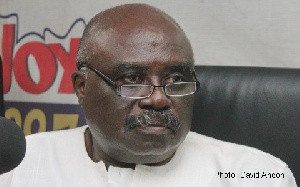When we were in primary school, my brother Tom and I begged my mom Auntie Christie to move from her brand new ‘bonglo’ at posh Danyame to return to live at the No water, No toilet, extended family house at Adum.
We left the comfort of our own rooms to share a bed with 6 others. As you would expect, we woke at 0400 each dawn to go fetch water at the public pipe and also deposit the excesses from the ladies of the house.
Naturally, we carried both the water and other things on our heads. Then we went to school, read the Cecil King Daily Graphic and got on with learning about the four seasons (when Ghana had only two) and got given Christian names, whether Christian, Muslim or Agnostic. We were left in no doubt that we were being transformed from, ‘savages’ to civilised fine gentlemen and ladies.
No wonder I found myself taking an uncharacteristically ambivalent position as I listened to last week’s scintillating debate on heads and the function. I was very comfortable with both its inferences and use from “Konongo Kaya” to “Use your Head”; the former in relation to carrying goods on your head, whilst the latter is for the more cerebral function.
For me, the debate reflected the experiences of the different classes of Ghana as we have transited from a mainly traditional African society to the modernity of Globalisation. It is not for once a division on partisan political points of reference or city versus urban upbringing and world view.
In my view, it is a conversation between the traditional / inspirational class versus the inspirational / globalisation generation. It is an argument between those who grew up from the traditional and aspired to modernity, and those who skipped the traditional experience completely and aspired to be global citizens whose world view is from social media.
My generation aspired to be modern without entirely jettisoning our experiences or our tradition. Yes, carrying water on our heads was a necessary chore, though we aspired to some day in the future when our household would soon be connected to the pipe. We saw that as progress or development, as many millions of our citizens do aspire to now. But we never, I mean never considered it an indignity to have carried water or other less pleasant wares on our heads.
There are also the traditional rejectionists. For this group getting schooled and becoming a ‘krakye’ meant jettisoning everything about your cultural background and adorning yourself and your whole life in western garb. Eating fufu with spoon, preferring to wear a tie and suit at every opportunity, looking down on serving local dishes at top class hotels and restaurants and preferring china ware to ‘asanka' - etc. Indeed, when I was VRA CEO, the staff dubbed me “Asanka Delight” for my insistence that I eat fufu in the right bowl and with my hand, not a spoon.
Then comes the inspirational / globalization generation of "Dada mma”. The generation who grew up in middle/upper class homes in the Metropolis, went to ‘international schools’, learnt ‘Baa Baa Black Sheep’ and never ever carried water on their heads, except for those whose parents sent them to the village during holidays for acculturation purposes.
Ghana 2016 is made up of all the three aforementioned classes in every corner of the country. There are millions of people living in Accra and Kumasi who have to carry water on their heads everyday in order to keep bodies and souls clean.
There are thousands of “kayayos’ who carry goods on their heads each day to eke out a living. There are millions of well-heeled Ghanaians who are probably more internet savvy than Steve Job’s children whose access to their own dad’s invention was severely restricted. There are loads of ‘the dadamma’ generation who are having to grapple with living their adult lives in settings less ideal than what they grew up in.
The important thing to note is that each and every class of Ghanaian has needs and considerations for development which they expect their political governors to provide when they seek their vote. And more importantly, each and every Ghanaian of sound mind and over eighteen will cast the same vote of equal weight in a General Election. This is not to introduce politics, but to point out that the needs of the Internet-savvy Ghanaian is just as important as the kayayo porter sleeping in kiosk.
The debate on the function of the head was very much a debate of the middle and upper class Ghana, and also from their own perspectives of what Ghana should be or is striving to be in the Global world of today.
Just as I have been lucky enough to have experienced both the traditional and the inspirational, I could relate to both the author’s vigorous defence of his illustration and Kofi Bentil’s more restrictive view of the function of the head.
I could do so because of my lucky experience of both, especially the insistence by Achimota School that our culture and traditions were of equal weight to the Whiteman’s vision of modernity. Ironically most of the teachers in Achimota in my day were white people.
So here is one case where I believe the function of the head of the ordinary Ghanaian can be two in one; both carrying goods and fermenting great ideas and innovations.
The scorecard appears very much to tip in favour of the overwhelmingly poor underclass. The goal of everything we seek to do as a nation should be to move the majority of our people to embracing the more cerebral function. But until we get there, there is no case for denigrating the majority whose experience is to carry water or loads on their heads
Charles Wereko-Brobby (Dr)
Chief Policy Analyst, Ghana Institute for Public Policy Analysis (GIPPO)
Opinions of Tuesday, 5 April 2016
Columnist: Charles Wereko-Brobby | tarzan@eyetarzan.org















